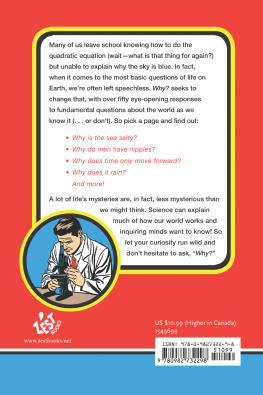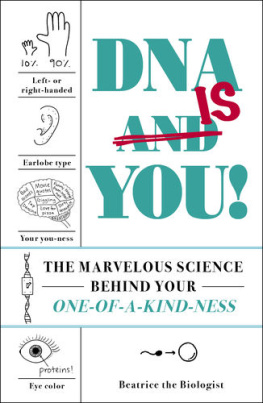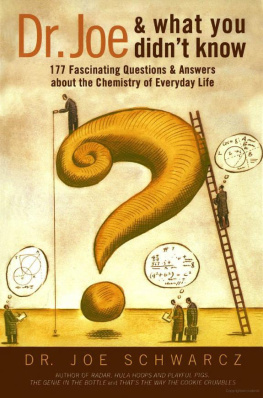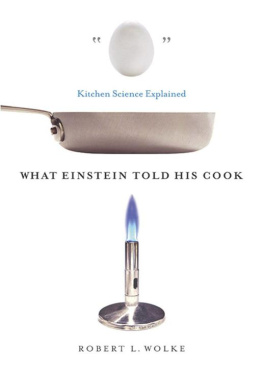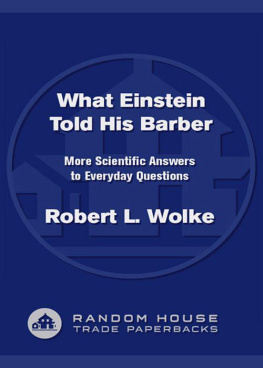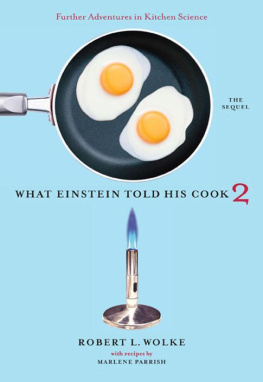Wolke - What Einstein didnt know: scientific answers to everyday questions
Here you can read online Wolke - What Einstein didnt know: scientific answers to everyday questions full text of the book (entire story) in english for free. Download pdf and epub, get meaning, cover and reviews about this ebook. year: 2012, publisher: Tantor eBooks, genre: Detective and thriller. Description of the work, (preface) as well as reviews are available. Best literature library LitArk.com created for fans of good reading and offers a wide selection of genres:
Romance novel
Science fiction
Adventure
Detective
Science
History
Home and family
Prose
Art
Politics
Computer
Non-fiction
Religion
Business
Children
Humor
Choose a favorite category and find really read worthwhile books. Enjoy immersion in the world of imagination, feel the emotions of the characters or learn something new for yourself, make an fascinating discovery.

- Book:What Einstein didnt know: scientific answers to everyday questions
- Author:
- Publisher:Tantor eBooks
- Genre:
- Year:2012
- Rating:4 / 5
- Favourites:Add to favourites
- Your mark:
- 80
- 1
- 2
- 3
- 4
- 5
What Einstein didnt know: scientific answers to everyday questions: summary, description and annotation
We offer to read an annotation, description, summary or preface (depends on what the author of the book "What Einstein didnt know: scientific answers to everyday questions" wrote himself). If you haven't found the necessary information about the book — write in the comments, we will try to find it.
Wolke: author's other books
Who wrote What Einstein didnt know: scientific answers to everyday questions? Find out the surname, the name of the author of the book and a list of all author's works by series.
What Einstein didnt know: scientific answers to everyday questions — read online for free the complete book (whole text) full work
Below is the text of the book, divided by pages. System saving the place of the last page read, allows you to conveniently read the book "What Einstein didnt know: scientific answers to everyday questions" online for free, without having to search again every time where you left off. Put a bookmark, and you can go to the page where you finished reading at any time.
Font size:
Interval:
Bookmark:
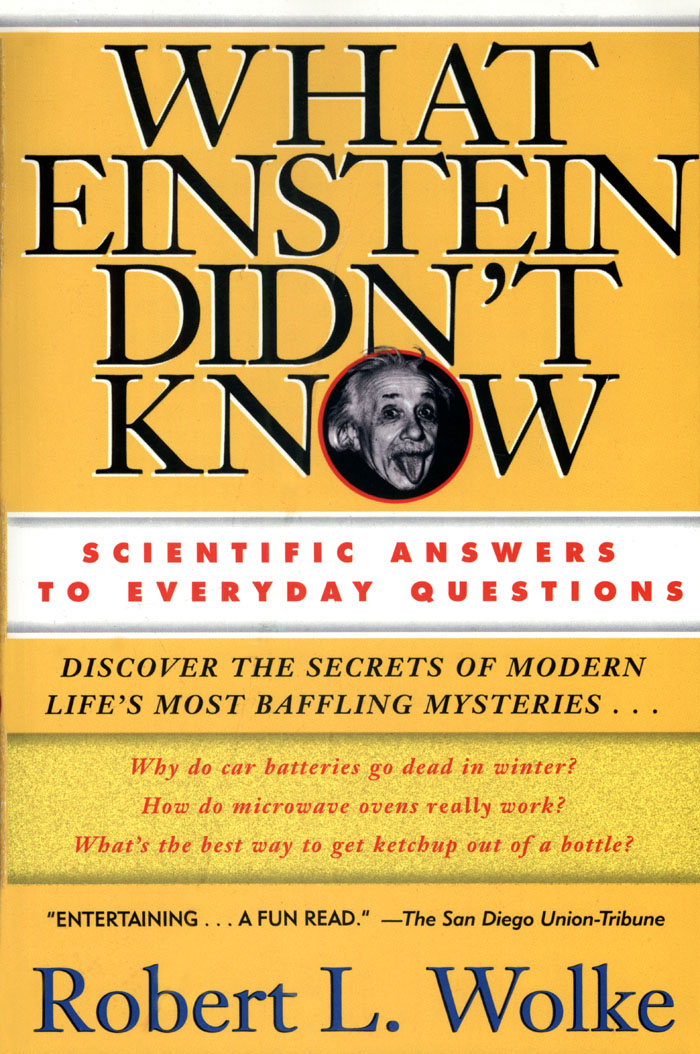
WOULDNT YOU LIKE TO KNOW?
Why cant you unburn a match?
Would a BB dropped from the worlds highest
building kill you if it hit you?
Why is fish meat white, dont they have blood?
How can cricket chirps tell us the temperature?
MYSTERIES ARE LURKING IN YOUR
KITCHEN, GARAGE, AND THE GREAT
OUTDOORS. NOW YOU CAN SOLVE THEM BY
UNCOVERING MOTHER NATURES CLEVEREST
TRICKS...AND MODERN SCIENCES
BEST-KEPT SECRETS!
How do food manufacturers figure out the number
of calories in their products? Why does cool water
thaw frozen foods faster than hot air? If you
are hauling a thousand pigeons in a tractor trailer,
will the load be lighter if you keep them flying?
WHAT EINSTEIN DIDNT KNOW
Scientific Answers to Everyday Questions
ROBERT L. WOLKE
WHAT EINSTEIN DIDNT KNOW
Copyright 1997 by ROBERT L. WOLKE
This electronic format is published by Tantor eBooks, a division of Tantor Media, Inc, and was produced in the year 2012, All rights reserved.
To my personal energizers: daughter Leslie, who has energized my teaching by continually asking Why, Daddy? and wife Marlene, who continually energizes my life by being a true partner.
Explanations of everyday household mysteries, includingHow does soap know whats dirt? How does bleach tell white from colors? How does salt make ice colder? How can you keep soda from going flat? How can a thermos container keep hot things hot and cold things cold? Why do water beds need heaters? Why wont your shower temperature stay the way you set it? How do batteries make electricity?
Answers to questions about foods and cooking, includingWhy cant you make water boil hotter by turning up the heat? How does a simmer differ from a slow boil? Why does cooking an egg make it hard, while cooking a potato makes it soft? How come you can melt sugar on the stove, but you cant melt salt? How do microwaves really cook food? Can you dissolve two cups of sugar in one cup of water? If you had a strong enough magnet, could you lift spinach?
Solutions to automotive puzzles, includingWhy wont your battery work well in cold weather? How does iron rust? Why does straight antifreeze freeze faster than a fifty-fifty mixture with water? Why wont sand always provide traction for your tires on ice? Why is it wrong to say that salt melts ice? Why wont oil and water mix? Why is oil such a good lubricant? Why does compressed air feel so cold? How does carbon monoxide kill?
Exposs of secrets of the supermarket, restaurant and shopping mall, includingHow do those miracle defrosting trays work? How do they know how many calories there are in a food? How do those instant cold compresses work? How does food get burned in the freezer? What is MSG, and how does it work? Is a rare steak really bloody? Whats the best way to get ketchup out of the bottle? What is the proof of an alcoholic beverage?
Explanations of natural marvels, includingWhy is there always a cool breeze at the seashore? Why do ocean waves always roll in parallel to the shoreline? Why is the sun hotter at noon? Why is it colder in the winter? Why can we see through air? Why is the barometric pressure measured in inches? How can you tell the temperature by listening to a cricket? How does the greenhouse effect work? What eventually becomes of a helium-filled balloon after you let it go outdoors?
The astounding feats of this astonishing liquid, includingWhy does evaporation have a cooling effect? How can a huge, steel aircraft carrier float on water? Do fish get the bends? Why are bubbles round? Are all liquids wet? Does hot water freeze faster than cold water? Why does ice float? Why does water seek its own level? Why does water put out fires?
How Mother Nature operates. Fundamental wonders of the universe, includingWhat does E = mc2 mean to you? Where does uranium get its energy? Why do magnets attract iron? If all the atoms and molecules in the world are moving, how did they get started, and why dont they run down? What does DNA actually do? Why cant we recycle energy? Is there some universal rule that determines what is possible and what is impossible?
Forget the word science. This book simply tells you whats going on beneath the surface of everyday things. It is for people who are curious about the world around them, but who dont have the time to seek out the explanations or may be a bit intimidated by science.
Of course, the answers to why everyday things happen must be scientificthat is, logical and accurate. But you wont find the usual pop-science nonanswers here that leave you just as mystified as before. Instead of mere answers, you will be given explanations: plain talk that I hope will lead you all the way to genuine, well-Ill-be-darned understanding.
Traditionally, people have encountered science in four places: classrooms, textbooks, childrens books, and in deadly serious tomes by solemn scientists. Unfortunately, science classrooms and textbooks have turned off at least as many people as they have turned on. (Dont get me started.) The fun books for kids are great, but they promote the false notion that only kids can be curious about things. And the solemn science books only perpetuate the conviction that science is inherently incomprehensible to ordinary mortals.
This is not a textbook, it is far from solemn, and it is not a fun book for kids. (But dont be surprised if your kids steal it from you.) It is a fun book for grown-ups. But it is not a collection of gee-whiz facts to be marveled at and instantly forgotten. Instead, it answers real questions that might be asked by real people in real situations: around the house, in the kitchen, in the garage, in the marketplace, and in the great outdoors.
There is no need to read this book in sequence. Browse to your hearts content and peruse any question that catches your eye; every explanation is self-contained. But whenever some closely related information exists elsewhere in the book, you will be referred to the question and answer unit in which it is explained.
As you browse, youll see a number of Try Its, tests and demonstrations that you can do yourself, whether seated at your kitchen table or on an airplane. You will also find a number of Bar Bets that may or may not win you a round of drinks, but will certainly spark a lively discussion.
Throughout the book, whenever an explanation threatens to become more than you want to know, the details are banished to a Nitpickers Corner for easy skipping. Occasional technical buzzwords are explained when they are used. But if you should stumble upon one and forget what it means, you will probably find it in the list of Buzzwords at the back of the book.
Okay, so youve looked ahead and seen the word molecule popping up almost everywhere, and youre afraid that the explanations might be too technical. Fear not. Molecule is just about the only technical buzzword that is absolutely unavoidable in explaining your everyday surroundings. You may already have a pretty good idea of what a molecule is, but for the purposes of this book, here is all you need to know:
A molecule is one of those invisibly tiny particles that everything is made of. All the things that you see and touch are different because their molecules are of different kinds, sizes, shapes, and arrangements.
Molecules are made of clusters of even tinier particles called atoms. There are about a hundred different kinds of atoms, and they can combine in an enormous variety of ways to form an enormous number of kinds of molecules.
Font size:
Interval:
Bookmark:
Similar books «What Einstein didnt know: scientific answers to everyday questions»
Look at similar books to What Einstein didnt know: scientific answers to everyday questions. We have selected literature similar in name and meaning in the hope of providing readers with more options to find new, interesting, not yet read works.
Discussion, reviews of the book What Einstein didnt know: scientific answers to everyday questions and just readers' own opinions. Leave your comments, write what you think about the work, its meaning or the main characters. Specify what exactly you liked and what you didn't like, and why you think so.


